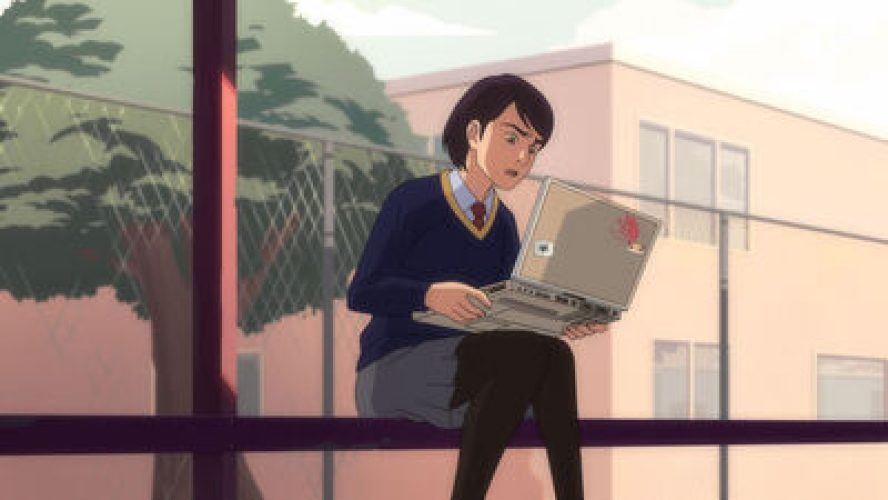The intersection of technology and humanity has been a theme of fiction, film, and even television for generations now. Embedded in the DNA of AMC+’s first animated drama series, “Pantheon,” premiering on Friday, September 1st, one can pull out material that owes a debt to everything from “2001: A Space Odyssey” to “Ghost in the Shell,” but it’s the work of Philip K. Dick that feels like the biggest influence on this project, even if it is based on a collection of short stories by sci-fi author Ken Liu. Those stories concern the concept of “Uploaded Intelligence,” and the myriad of questions that spill out when one considers the idea that a human being could exist outside of its mortal shell. The creators of “Pantheon” dive deeper into their concepts with each of the four episodes sent for press, sometimes too obviously underlining their themes instead of letting them feel organic, but there’s no denying that this show casts a unique spell that grows with each chapter. My initial apprehension after the premiere had given way to curiosity as to where these characters are going by the time the episodes sent for press were complete.
“Pantheon” starts with the introduction of Maddie (Katie Chang), a teenager struggling with both school bullies and the grief of her father’s recent death when she discovers the impossible. Her father, David (Daniel Dae Kim) contacts her from the great beyond. Well, sorta. It turns out that his consciousness was uploaded to the Cloud by a nefarious corporation who told his widow Ellen (Rosemarie DeWitt) that the experiment to do exactly that had failed. Why is David still a ghost in the machine? Who is controlling him? How did he get free enough to contact Maddie? And while Maddie embraces having him back, her mother struggles to believe that this non-corporeal version of her husband is the same as the man she’s lost.
Meanwhile, a young man named Caspian (Paul Dano) helps Maddie but also struggles with a very different parental dynamic as his are fighting all the time. At least, he thinks they are. For some reason, parents Cary (Aaron Eckhart) and Renee (Taylor Schilling) are playing out the roles of a dysfunctional home, complete with an abusive father, but they’re following orders from somewhere else to push Caspian toward what feels like a predetermined fate. What do they know about Caspian’s future? Why are they trying to manipulate it? And what are the writers saying here about the way real people can be ‘programmed’ as much as electronic ones?
The voice work throughout “Pantheon”—which also includes Maude Apatow, Scoot McNairy, Chris Diamantopoulos, Corey Stoll, Ron Livingston, and the final work of William Hurt—is excellent, playing the drama of the show as they would were it a live-action program. Some of them struggle a bit with the occasionally over-written slice of dialogue about what it means to be a human being. The show is stronger when it’s allowing its themes to emerge organically from the dense plotting instead of literally placing them in a spotlight. For example, in a flashback, David and Maddie conspire to put a cheat code in a game that makes it so you can’t die, leading mom to literally ask, “What’s the point of the game if you can’t die?” Ditto life, right?
“Pantheon” constantly circles these conversations about the meaning of life and how technology has shaped the way we experience and appreciate existence. It can be a heady mix of ideas, almost increasingly overwhelming as it adds new subplots and characters, especially as it reveals that David may not be alone in the machine world. How could people use uploaded consciousness in nefarious ways? Imagine a machine that doesn’t know it’s a machine. We’re getting into “Matrix” territory here.
“Pantheon” feels like it’s at an interesting tipping point after the final episode sent for press, either right about to pull together its ideas and characters or introduce one too many. If it does succumb to its own over-packed concept, it will be because Craig Silverstein and his team were almost too ambitious here, trying to do so much with one season of television, and it’s hard to come down too hard on a show that’s trying to be too smart given how much TV is still pretty dumb. After all, our time on Earth is limited. At least for now.
Four episodes screened for review. Premieres on AMC+ on September 1st
The intersection of technology and humanity has been a theme of fiction, film, and even television for generations now. Embedded in the DNA of AMC+’s first animated drama series, “Pantheon,” premiering on Friday, September 1st, one can pull out material that owes a debt to everything from “2001: A Space Odyssey” to “Ghost in the Shell,” but it’s the work of Philip K. Dick that feels like the biggest influence on this project, even if it is based on a collection of short stories by sci-fi author Ken Liu. Those stories concern the concept of “Uploaded Intelligence,” and the myriad of questions that spill out when one considers the idea that a human being could exist outside of its mortal shell. The creators of “Pantheon” dive deeper into their concepts with each of the four episodes sent for press, sometimes too obviously underlining their themes instead of letting them feel organic, but there’s no denying that this show casts a unique spell that grows with each chapter. My initial apprehension after the premiere had given way to curiosity as to where these characters are going by the time the episodes sent for press were complete. “Pantheon” starts with the introduction of Maddie (Katie Chang), a teenager struggling with both school bullies and the grief of her father’s recent death when she discovers the impossible. Her father, David (Daniel Dae Kim) contacts her from the great beyond. Well, sorta. It turns out that his consciousness was uploaded to the Cloud by a nefarious corporation who told his widow Ellen (Rosemarie DeWitt) that the experiment to do exactly that had failed. Why is David still a ghost in the machine? Who is controlling him? How did he get free enough to contact Maddie? And while Maddie embraces having him back, her mother struggles to believe that this non-corporeal version of her husband is the same as the man she’s lost. Meanwhile, a young man named Caspian (Paul Dano) helps Maddie but also struggles with a very different parental dynamic as his are fighting all the time. At least, he thinks they are. For some reason, parents Cary (Aaron Eckhart) and Renee (Taylor Schilling) are playing out the roles of a dysfunctional home, complete with an abusive father, but they’re following orders from somewhere else to push Caspian toward what feels like a predetermined fate. What do they know about Caspian’s future? Why are they trying to manipulate it? And what are the writers saying here about the way real people can be ‘programmed’ as much as electronic ones? The voice work throughout “Pantheon”—which also includes Maude Apatow, Scoot McNairy, Chris Diamantopoulos, Corey Stoll, Ron Livingston, and the final work of William Hurt—is excellent, playing the drama of the show as they would were it a live-action program. Some of them struggle a bit with the occasionally over-written slice of dialogue about what it means to be a human being. The show is stronger when it’s allowing its themes to emerge organically from the dense plotting instead of literally placing them in a spotlight. For example, in a flashback, David and Maddie conspire to put a cheat code in a game that makes it so you can’t die, leading mom to literally ask, “What’s the point of the game if you can’t die?” Ditto life, right? “Pantheon” constantly circles these conversations about the meaning of life and how technology has shaped the way we experience and appreciate existence. It can be a heady mix of ideas, almost increasingly overwhelming as it adds new subplots and characters, especially as it reveals that David may not be alone in the machine world. How could people use uploaded consciousness in nefarious ways? Imagine a machine that doesn’t know it’s a machine. We’re getting into “Matrix” territory here. “Pantheon” feels like it’s at an interesting tipping point after the final episode sent for press, either right about to pull together its ideas and characters or introduce one too many. If it does succumb to its own over-packed concept, it will be because Craig Silverstein and his team were almost too ambitious here, trying to do so much with one season of television, and it’s hard to come down too hard on a show that’s trying to be too smart given how much TV is still pretty dumb. After all, our time on Earth is limited. At least for now. Four episodes screened for review. Premieres on AMC+ on September 1st Read More


